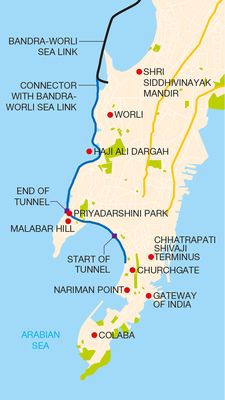What does a Mumbaikar value the most? Time, perhaps. It is a luxury very few can afford in a city that is always on the move, as if in a race against time. And, the Brihanmumbai Municipal Corporation (BMC), the wealthiest in the country, is trying to buy some time for its citizens. It has come up with an ambitious project that is expected to reduce travel time between south Mumbai and the western suburbs from two hours to 40 minutes. It will also help ease traffic on some of its busiest roads like the Western Express Highway and Link Road.
The Mumbai Coastal Road project intends to connect the iconic Marine Drive in the south to Kandivili junction in the north. The high-speed corridor―35.60km long―comprises an eight-lane road reclaimed from the sea, a bridge on stilts, an elevated road, and twin tunnels below Malabar Hills. There will be new green spaces, a sea wall and multiple interchanges for traffic dispersal.
The coastal road project seeks to create large patches of open green space, a rarity in Mumbai. But it would come at the cost of the sea―about 111 hectares will be reclaimed, of which 70 hectares will be landscaped to provide cycle tracks, promenades, amphitheatres, children’s play areas and other recreational spaces. The project predictably ran into trouble, with petitions being filed in the High Court about its impact on coastal ecology. It also received backlash from the fishing community. The project, which saw a start in November 2018, was stayed by the High Court. The matter then went to the Supreme Court, which finally lifted the stay in December 2019.
And, that is when the work on the first phase―coastal road project (south)―truly began. The first phase, costing Rs12,721 crore, involves the construction of a 10.58km-long coastal road from Shamaldas Gandhi Marg (Princess Street Flyover near Marine Lines railway station) to the Worli end of the Bandra-Worli Sea Link. Once open, Mumbaikars can cover the stretch in just 10 minutes, says the BMC. From Malabar Hill to the sea link, the coastal road is mostly built on reclaimed land, around 50m to 70m into the sea. India’s largest twin tunnels will have three lanes, one of which will be reserved for emergency traffic.
The coastal road project (south) has a November 2023 deadline, and 65 per cent of its work is complete. Work on the second phase, said to start from Versova and end at Dahisar, is expected to begin this year.


